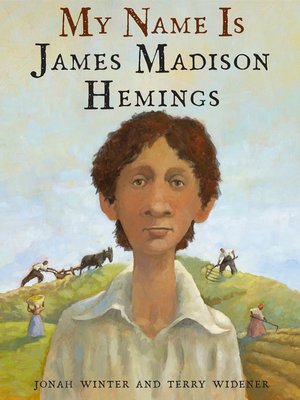
Sign up to save your library
With an OverDrive account, you can save your favorite libraries for at-a-glance information about availability. Find out more about OverDrive accounts.
Find this title in Libby, the library reading app by OverDrive.



Search for a digital library with this title
Title found at these libraries:
| Library Name | Distance |
|---|---|
| Loading... |
A New York Times Notable Book
A powerful historical picture book about the child of founding father Thomas Jefferson and the enslaved Sally Hemings.
In an evocative first-person account accompanied by exquisite artwork, Winter and Widener tell the story of James Madison Hemings’s childhood at Monticello, and, in doing so, illuminate the many contradictions in Jefferson’s life and legacy. Though Jefferson lived in a mansion, Hemings and his siblings lived in a single room. While Jefferson doted on his white grandchildren, he never showed affection to his enslaved children. Though he kept the Hemings boys from hard field labor—instead sending them to work in the carpentry shop—Jefferson nevertheless listed the children in his “Farm Book” along with the sheep, hogs, and other property. Here is a profound and moving account of one family’s history, which is also America’s history.
An author's note includes more information about Hemings, Jefferson, and the author's research.
"This gentle, emotional book is a reminder that many presidents’ biographies have distressing aspects. . . . A simple but historically solid introduction to some of the moral crises slavery presented for our nation." —The New York Times
"Through a poignant first-person monologue, Winter imagines the peculiar upbring- ing of Virginia slave James Madison Hemings, son of Thomas Jefferson and his enslaved mistress, Sally Hemings.”—Bulletin, starred review
A powerful historical picture book about the child of founding father Thomas Jefferson and the enslaved Sally Hemings.
In an evocative first-person account accompanied by exquisite artwork, Winter and Widener tell the story of James Madison Hemings’s childhood at Monticello, and, in doing so, illuminate the many contradictions in Jefferson’s life and legacy. Though Jefferson lived in a mansion, Hemings and his siblings lived in a single room. While Jefferson doted on his white grandchildren, he never showed affection to his enslaved children. Though he kept the Hemings boys from hard field labor—instead sending them to work in the carpentry shop—Jefferson nevertheless listed the children in his “Farm Book” along with the sheep, hogs, and other property. Here is a profound and moving account of one family’s history, which is also America’s history.
An author's note includes more information about Hemings, Jefferson, and the author's research.
"This gentle, emotional book is a reminder that many presidents’ biographies have distressing aspects. . . . A simple but historically solid introduction to some of the moral crises slavery presented for our nation." —The New York Times
"Through a poignant first-person monologue, Winter imagines the peculiar upbring- ing of Virginia slave James Madison Hemings, son of Thomas Jefferson and his enslaved mistress, Sally Hemings.”—Bulletin, starred review







